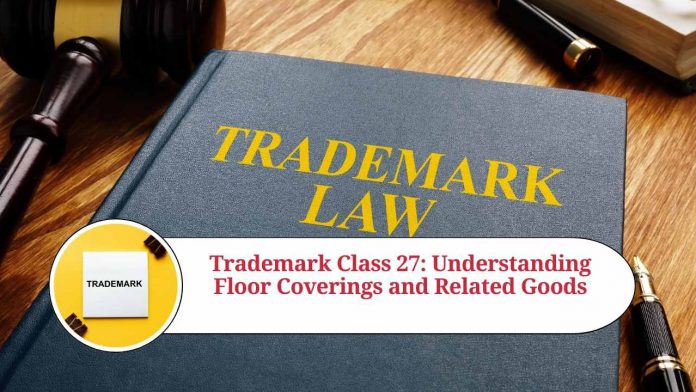Introduction
Trademark registration is a crucial aspect for any business, as it provides legal protection to their brand identity. When registering for a trademark, it is important to choose the appropriate trademark class, as each class pertains to specific goods or services. In this blog, we will be discussing Trademark Class 27, which pertains to carpets, rugs, and other floor coverings.
What is Trademark Class 27?
Trademark Class 27 includes all goods related to carpets, rugs, mats, and other floor coverings made of textile materials. This class also includes linoleum and other materials used for covering existing floors.
Goods included in Trademark Class 27
The following goods are included in Trademark Class 27:
- Carpets, rugs, and mats made of textile materials
- Linoleum and other materials used for covering existing floors
- Textile wall hangings
- Wallpaper made of non-paper materials
- Artificial turf
Goods not included in Trademark Class 27
The following goods are not included in Trademark Class 27:
- Yoga mats (Class 28)
- Gymnastic mats (Class 28)
- Floor coverings made of rubber, plastic, or other materials (Class 17)
- Floor mats for vehicles (Class 12)
Why is it important to choose the right trademark class?
Choosing the right trademark class is crucial for the registration and protection of a trademark. The appropriate class ensures that the trademark is registered for the goods or services that it is intended for. In case of infringement, the trademark owner can take legal action against the infringing party. Choosing the wrong trademark class can lead to rejection of the trademark application or limited protection.
Trademark Class 27 is important for businesses that manufacture or sell floor coverings made of textile materials. It includes a wide range of products, such as carpets, rugs, mats, and linoleum. These goods are often used in homes, offices, and other commercial spaces to add aesthetic appeal, provide comfort, and protect floors from wear and tear.
Textile wall hangings and wallpaper made of non-paper materials are also included in this class. Textile wall hangings are decorative pieces that can be hung on walls to add a touch of elegance and sophistication to a room. Non-paper wallpaper, on the other hand, is made of materials such as vinyl or fabric and is often used in commercial spaces such as hotels, restaurants, and offices.
Artificial turf is another product included in Trademark Class 27. It is a popular alternative to natural grass in sports fields and other outdoor spaces, as it requires less maintenance and provides a consistent playing surface. Artificial turf is also used in residential and commercial landscaping to create a low-maintenance and durable outdoor space.
It is important to note that not all floor coverings are included in Trademark Class 27. Gymnastic mats and yoga mats are classified under Class 28, as they are designed specifically for athletic or recreational activities. Floor mats for vehicles are classified under Class 12, as they are intended for use in automobiles.
Conclusion
In conclusion, Trademark Class 27 is a crucial class for businesses involved in the manufacture or sale of floor coverings made of textile materials. Choosing the correct trademark class ensures that the trademark is registered for the intended goods or services and provides legal protection in case of infringement. It is recommended to consult with a trademark attorney to ensure the correct classification of a trademark.
Read more useful content:
Frequently Asked Questions (FAQs)
What is Trademark Class 27?
Trademark Class 27 pertains to carpets, rugs, mats, and other floor coverings made of textile materials. It also includes linoleum and other materials used for covering existing floors.
What types of products are included in Trademark Class 27?
The goods included in Trademark Class 27 are carpets, rugs, mats, linoleum, textile wall hangings, wallpaper made of non-paper materials, and artificial turf.
What types of products are not included in Trademark Class 27?
Yoga mats, gymnastic mats, floor coverings made of rubber, plastic, or other materials, and floor mats for vehicles are not included in Trademark Class 27.
What is the importance of choosing the right trademark class?
Choosing the right trademark class is important to ensure that the trademark is registered for the intended goods or services and provides legal protection in case of infringement.
Can a single trademark be registered in multiple classes?
Yes, a single trademark can be registered in multiple classes, as long as it pertains to the goods or services in those classes.
Can I apply for trademark registration on my own?
Yes, you can apply for trademark registration on your own, but it is recommended to consult with a trademark attorney to ensure the correct classification of the trademark.
How long does it take to register a trademark?
The time taken to register a trademark varies from country to country. Generally, it can take anywhere from 6 months to a year or more.
How long does a trademark registration last?
The duration of a trademark registration also varies from country to country, but it typically lasts for 10 years and can be renewed indefinitely.
What is the cost of trademark registration?
The cost of trademark registration varies depending on the country and the number of classes the trademark is registered under. It is recommended to consult with a trademark attorney for an accurate estimate.
Can a registered trademark be challenged?
Yes, a registered trademark can be challenged if it is found to be infringing upon the rights of another party or if it was improperly registered.




















